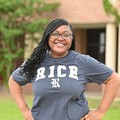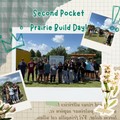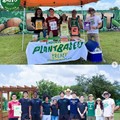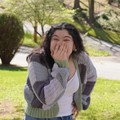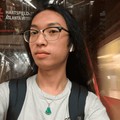Initially, working at my aunt's ice cream parlor, Antojitos & Ice Cream, meant trying to scrape together some spending cash on the side. I imagined it would be like all those run-of-the-mill after-school jobs—scooping ice cream, polishing counters, and listening to customers. But I quickly recognized that the shop was more than a dessert place; it was this small piece of home for our Hispanic community, and being part of it, without reservations, made me understand better what connection really looks like.
Our customers are from all walks of life-hardworking parents, grandparents, teenagers, and toddlers. Most are immigrants like my own family. Some are still adjusting to life here, juggling work, raising children, and staying connected with their native culture. In the shop, people switch between English and Spanish, ask about flavors they remember from their childhood, and share stories about their lives. It's not just a business-it's a place where people get accustomed, welcome, and understood.
One moment I really remember. A mother came into the shop one evening with her three children. She appeared to be tired-you could see she must have had one very long day. But even though maybe her purse wasn't that dabbed with money, she wanted to treat her kids to something. Yeah, she seemed to pick out what they wanted by gazing as I scooped their orders. Without even thinking too hard about it, I added an extra scoop to one of the cups and just smiled. She looked at me, and even though she didn't say much, I could see how much it meant to her. That moment reminded me of how kindness need not be loud or dramatic-it can be quiet and small and still mean everything.
That's what really taught me this community: that connection is showing up for people in small ways. Remembering someone's usual order, talking to someone in their first language, or simply listening to them ramble about their day makes them feel like they belong.
Being part of this community instilled in me a certain assurance-not just in my future, but for the kind of world I want to help build. I have seen how people support each other in hard times. I have learned that adversity is not just about showing giant victories; it is mostly about keeping on, about showing up, and about caring for others no matter what.
Into the future, I want to carry such lessons with me, especially concerning being a person who wants to go into healthcare and become a midwife. I have seen how vital it is for people to feel unbiasedly visible and cared for and how powerful connecting with someone during vulnerable moments can be.
This taught me that community is not something that you just live in-it is something you construct as well. Because of that, I am more hopeful than ever.
The first time I met Mia, she was sitting alone on the cracked concrete of Fonde Recreation Center’s playground, her small hands trembling as she clutched a paintbrush. The other kids were running wild, full of laughter and energy, but she barely dared to lift her eyes. I remember how quiet she was, like she was carrying the weight of the world in her silence.
I sat beside her, carefully asking about the colors she chose and the stories behind her paintings. Day by day, that quiet trembling hand grew steadier, and her shy smiles became laughter that filled the room. By summer’s end, Mia was leading a group of younger kids through an art project, her confidence glowing brighter than the Texas sun. Watching her transformation was the moment I truly understood how hope grows, not from words, but from presence, patience, and belief.
Growing up in Houston, I’ve always understood how important community is. My neighborhood didn’t have everything we needed, but it was full of people who cared enough to show up, like Mrs. Johnson, our elderly neighbor who was recovering from surgery. Families from all around brought her meals, checked in on her, and even mowed her lawn. Those small acts of kindness weren’t just helpful. They created a safety net that kept us all afloat. It taught me that community means showing up for each other, even when it’s inconvenient or hard.
This belief pushed me to volunteer with AliefVotes, helping young people register to vote and get involved. I remember one young man telling me, “Why bother? No one listens anyway.” Instead of arguing, I listened to him, and I shared stories of neighbors who used their voices to change local laws and improve lives. A few days later, he came back with his registration card in hand. The weight of that card in his hands was more than just paper. It was a promise of change. That moment filled me with so much hope and showed me that change starts with small actions and real conversations.
During my internship at the Mayor’s Office, I saw firsthand how community leaders work. I sat in meetings where officials listened carefully to local business owners, learning about their struggles before making decisions. That experience taught me that leadership is about standing with people, lifting others, and working together to create solutions.
All these experiences, Mia’s growing confidence, neighbors’ kindness, voters finding their voices, and leaders listening, have filled me with a deep hope for the future. Hope that isn’t passive or naïve, but alive and active through connection, kindness, and hard work.
As I prepare to start my journey at Rice University, I carry this hope with me and a clear goal. I want to work in women’s reproductive health because I’ve seen too many Black women in my community ignored or dismissed by doctors. I want to create safe spaces where women’s voices are heard, their stories valued, and their health needs met. I know that real change starts by showing up, listening closely, and fighting fiercely for those who need it most.
Being part of a community has taught me that leadership isn’t about titles or the spotlight. It’s about sowing kindness, standing up for others, and lifting people as you climb. Every smile I’ve shared, every hand I’ve held, every voice I’ve helped empower, these are the seeds of a better future. Just like Mia’s brushstrokes that summer, small acts can grow into something beautiful and powerful. I’m ready to keep planting them, one act of hope at a time.
I never expected a Facebook Live to change someone’s life but it did. For years, I was silent. I didn’t talk about my disease, not because I didn’t care, but because I was embarrassed that I wasn’t “normal.” I didn’t want to be known as the sick girl, the one who couldn’t breathe right or who needed help walking across a room. But behind that silence was a diagnosis that nearly took my life and eventually helped save someone else’s.
At nine years old, I was diagnosed with Juvenile Dermatomyositis (JDM), a rare autoimmune disease that attacks the muscles and organs. Because of my dark skin, the rash that signals the disease went unnoticed for months. By the time doctors figured it out, my lungs were failing. I was told I had 3 to 5 years to live without a lung transplant and would need to move to Texas just to qualify for one. While I was losing my strength, my mother was fighting breast and ovarian cancer and still somehow taking care of me while taking care of herself.
What made it harder was knowing the doctors didn’t fully know what to do with me. My case was so rare and so advanced that I became, in many ways, a medical experiment. But I didn’t mind. If using my body and my treatment plan could help build a standard of care for kids in Georgia who looked like me, then I could live with the needles, the tests, and the fear. Still, I carried survivor’s guilt, especially after learning a young Black boy with the same condition died just months before my diagnosis.
For a long time, I kept that pain to myself. But eventually, my mom and I decided to share our story. We went live on Facebook and taught people what JDM looks like in children of color how it presents differently, what to ask for, and how to advocate for proper testing. One of the people who saw it was my mom’s old college friend. Her daughter had similar symptoms, and because of our video, she knew exactly what to push for. Her daughter got diagnosed early and treated in time.
That moment changed everything for me. It showed me that my voice could be a lifeline, that sharing what I once felt ashamed of could literally save lives. For the first time, I understood that being part of a community means giving what you’ve lived through so that someone else might suffer less. That one act of honesty one live video created a ripple effect of awareness, empathy, and access.
Being part of that community gave me something I hadn’t felt in years: hope. Hope that kids who look like me will no longer go undiagnosed. Hope that being different doesn’t mean being invisible. Hope that speaking up can lead to real, lasting change.
Now, as a Criminal Justice and Psychology major, I carry those lessons with me. I want to work in forensic psychology and law not just to fight legal battles, but to stand up for people who feel unseen, unheard, or misunderstood, just like I once did. I stayed silent for years because I was ashamed. Now I speak because I know that silence can cost lives and community can save them.
As an Atlanta native, I have always been aware of the city’s substantial homeless population. I used to hold the common belief that these individuals were homeless because of their choices or a lack of ambition in life. However, my experience as a member of the Labre Ministry club at my school has profoundly altered my perspective on homelessness and mental health awareness, and it has also shaped my sense of hope for the future.
The club’s essential goal is to assemble meals and hygiene kits for distribution to the less fortunate in the downtown area. Initially, I was hesitant to interact with the people we would encounter because of the stigma associated with the homeless. Yet, over the last three years, as I have spoken with hundreds of individuals, my perception changed drastically. I have come to realize that these individuals are as deserving of compassion as anyone else. Many of them are without shelter because of unemployment, domestic violence, and mental illness. These circumstances often lead to substance abuse, which further stigmatizes them in society.
Labre Ministry has shown me that they deserve understanding and assistance, a message I continue to advocate for as the club's Vice President. Meeting new faces each week and witnessing the resilience of familiar ones inspires me to keep working for the homeless community. These interactions have strengthened my belief that progress is possible and that communities built on empathy can create meaningful change. Engaging in meaningful discussions about their pasts, filled with both highs and lows, has shown me that even small actions can have a profound impact on someone's life.
Along our weekly route, the relationships I have maintained with the homeless motivate me to keep providing a smile to everyone, regardless of their circumstances. Through my experience in Labre Ministry, I have gained valuable insights and developed stronger communication skills. Most importantly, it has given me hope that compassion, advocacy, and consistent human connection can lead to a future where society treats every individual with dignity and care.
A commitment I want to build for my future and my community is working towards health equity. While a daunting task, it is an important goal so that marginalized communities have more trust in the healthcare system and autonomy over their physical and mental health. I have hope for the future because every week when I volunteer at the Winship Cancer Institute, I see firsthand the interactions between struggling patients and volunteers. Patients have a sense of hope and happiness once volunteers arrive. A patient’s only goal should be focusing on getting better, not worrying about whether they can afford their next appointment. This showed me their resilience in not only fighting to get better, but maintaining a positive attitude when adequate care is not always accessible. The difficulty in getting affordable treatment, especially for minority populations, is an inequality I cannot ignore. This led to my initial interest in a public health career, and I wanted to build up communities. I want to contribute to increasing access to healthcare resources for our most vulnerable populations.
I plan to build on my experience as an intern in the pediatrician clinic at Meharry Medical College. Marginalized populations are more susceptible to reduced access to care, and I saw how the clinic addressed these disparities to improve health equity. A lot of patients, especially mothers, arrive scared for their child’s health, and on top of this stressful feeling, there is a language barrier with the staff. At the clinic, I used my medical Spanish skills to ensure that patients and their families understood their diagnoses. While many people may overlook something as simple as communication, I cherished the moments when I could communicate and connect with someone in a way that was most comfortable to them and eased a mother’s worry about her newborn.
Over time, I built trust with patients, encouraging ongoing engagement in future visits, which is critical for preventive care. Every person walks into a healthcare setting with preconceived notions based on their experiences, so I strove to provide the same level of care to English and non-English-speaking patients. My experience made me see how essential it is to have public health solutions now, from improving everyday interactions in a clinic to global interventions that resolve problems that affect millions. Something as simple as providing a smile when you interact with patients, or lend a helping hand can really go a long way in healthcare. Reflecting on my time in the clinic, I want to create practical solutions to make a more equitable world by advocating for underserved communities.
With my experience working with different communities, I understand that every city, every zip code, and every house has a distinctive need. When I become a public health director, I aim to fulfill the specific needs of my community while applying long-term solutions. I will take with me my volunteering experiences to remember what a simple act of kindness can do for a patient, especially going through difficult times. Public health professionals need to provide preventive services, especially for vulnerable populations, but most importantly to treat patients like people. This can be done by volunteering at underserved clinics. As a result, fewer people will suffer from chronic conditions. This is how I know my commitment to build a better future for my community will succeed. I am driven to have an impact on public health to build on the foundation of my public health interests and experiences and to aid me in providing a collaborative approach to systemic change at a local level.

